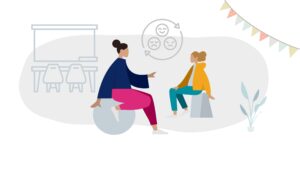Articles SEL and Mindfulness in Schools

In schools worldwide, wellbeing has been catapulted to the top of the agenda – and not before time. Educators are recognising that the key to a great education lies in nurturing both emotional and academic intelligence.
Stretched budgets, workplace stress, and the continued pressure to ‘catch up’ after the pandemic are just some of the factors forcing many teachers to reassess their priorities and seek out alternative ways to make a living.
This revolving door of recruitment means that, if nothing changes, we are in danger of losing a wealth of inspiring, dedicated and talented staff from our classrooms, and the ramifications for young people cannot be overstated.
Listen to our podcast about supporting staff emotional wellbeing.
So, how do we stem the flow of superb practitioners, as well as ensuring that students are being given every opportunity to thrive and fulfil their potential in all areas? With wellbeing now centre stage, perhaps it is time to consider a broader, more holistic approach to teaching and learning, and prioritise social and emotional learning and mindfulness.
The question is: what do these terms mean in practice, and why are such approaches pivotal to both wellbeing and academic outcomes across our school communities?
According to the EEF, social and emotional learning, or SEL, ‘…seeks to improve pupils’ decision-making skills, their interactions with others and their self-management of emotions, rather than focusing directly on the academic and cognitive elements of learning.’
Most SEL teaching focuses on the development of 5 core competencies:
While, at first glance, these may seem to have very little connection with academic performance and achievement, they are in fact the bedrock of creating effective, competent and resilient learners.
The skills and competencies delivered by a high-quality SEL approach equip individuals with the tools they need to succeed, not only academically but also personally. When students are explicitly taught techniques, through well-constructed and planned activities, to recognise their emotions, establish and maintain healthy relationships, and make positive, constructive choices, they become far more effective at handling the day-to-day pressures of life within and beyond the classroom.
Post Rating
You must be logged in to vote.
To view this content, you must have active Team Teach certification. Please register or log in and check your certificate number is added to your profile.
The Team Teach Knowledge Hub is a global community containing content from around the world. Please exercise your professional judgment to determine the appropriateness of any of our resources for your specific sector and geographic region, and be aware of the applicable laws and guidelines governing your organisation.